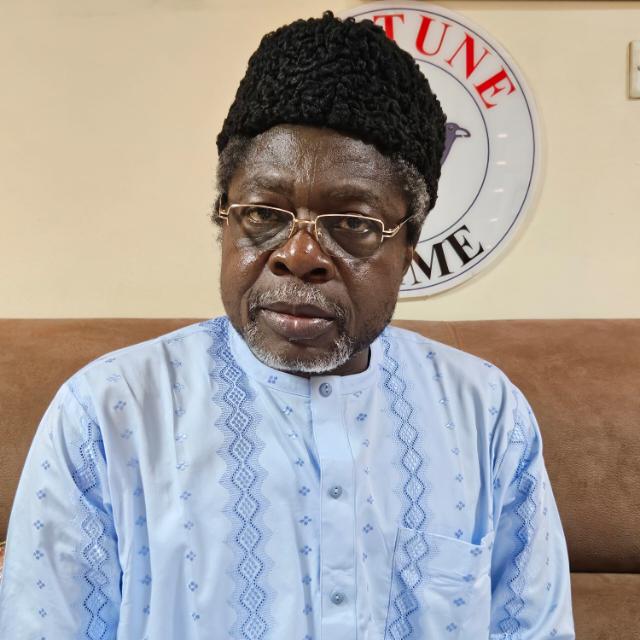I want to write about the civil war in Egbe Afenifere, then I remember what happened to the lame orphan who thought he could be the referee in a fight of witches. He was too ‘small’ for that magisterial job. I am too, and so, I will hide behind metaphors and allusions in engaging the owls of the west.
Small Yoruba men inflict and celebrate cracks in their ancestral walls; I shake my head for them. There is a ghetto in every mansion; a child of the house must not be seen arrowing the floors to that dingy room. It should not be his pride, his call; it may even be an act of self-directed war; treachery against the self. And traitors are not few in these desperate times. So much is involved: money, power; more money and more power. Politicians have looked at the very high stakes; they have seen the colossal height and are determined to bring the stakes down to their size. But when you callously bend your family’s fruity apple tree because you want its harvest, you break and kill the golden tree. I plead: Let no one destroy the Afenifere roof; there will be rains very soon.
Samuel Johnson’s ‘The History of the Yorubas’ is a book of intrigues and wars. Across its hills and valleys, the plot remains constant and predictable. From “the earliest times to the beginning of the British Protectorate,” long-term discord and short-term concord, treachery and rebellion; defeat and victory are the reigning themes; they dot the Yoruba landscape and define its relationship with itself. There is always a slithery Mephistopheles, soul-eating trickster-demon sliding and drawing wedges. He is in every culture; in William Shakespeare’s The Merry Wives of Windsor, he is called Mephistophilus; in Yoruba, he is Èsù Òdàrà, the ultimate deals-man who gives beautiful nothings in exchange for the soul. Mephistopheles is the celebrated king of the crossroads; he offers deals and damns the offeree. The fall of the mighty Old Oyo had the demon’s fingerprints and toe marks. The shapeshifter is a constrictor; he goes for every willing contractor, and he gets his prize, whatever the price.
Beautiful brides are, in all history, endangered. Someone described last week’s huge noise in the inner room of Afenifere as resistance to an attempted abduction. I call it bride-kidnap. A tribe in Central Asia calls it Ala Kachuu, or take-and-run. Every election cycle, even as it lacks billions to buy votes, Afenifere’s sombre beauty as a “lady of means” dazzles the skies like the full moon. And politicians would always take full advantage of any opening that could give victory. With the die of the 2023 election already cast, every foul should be deemed fair. And if the beautiful bride won’t acquiesce quietly, why not use the old way of seize-and-run? Bride-kidnap long existed in Yorubaland. It was witnessed in the hinterlands up till the mid-1970s. And now, I wonder why no one saw the abduction of a girl into willing, even unwilling, bride-hood as a colada of crimes: assault, battery, theft of person, rape. But the Akure abduction, if it was an abduction, was both consensual and non-consensual; it depends on who or what you think the bride is. If the bride here was the aged, I would say it was with the explicit consent of the abductee. The scream and the squirm that normally follow street and closet seizures were absent from the hostage – but cries were heard from the group. “A happy marriage begins by crying” is how the Kyrgyz of Kyrgyzstan philosophize bride-grab and the consequential rape that attract no consequences. That the de jure and the de facto Afenifere leadership shouted and made to shoo off the kite from their chicken is proof of lack of group consent, an explicit group resistance to the adoption scheme. Was the Akure journey of the APC and its crowd of mixed minds, therefore, a successful expedition? No. Rather, it has widened the cracks in the Yoruba wall – and the calculative snakes and lizards outside have noted the tragic error; but they are quiet.
What does it mean to have a divided house? On June 16, 1858, Abraham Lincoln was chosen by his Republican party to run against Democrat Stephen Douglas for the U.S. Senate. Lincoln’s convention speech was about unity and about the consequences of having a divided country. He borrowed words from religion and told his nation: “A house divided against itself cannot stand.” What he said is from the Bible and, there, it comes fuller and with tighter pungency: “Every kingdom divided against itself is brought to desolation; and every city or house divided against itself shall not stand.” The American civil war broke out three years after that counsel from Lincoln. The cost was high; the cost of disunity is always very high. Ask history how division works: Ancient Greece was great; it occupied the same position that the United States occupies today; it was the Asíwájú of the Universe – including the vast voids of the seas and the deep space of knowledge and mystery. Greece was the model in military strength, in learning and culture. But years of internecine strifes and wars among its city-states cracked its walls. It was conquered by a smart, united people called the Romans who subsequently ruled almost all Europe for over 1,000 years. But Rome also went the way of Greece. We’ve been told and taught since infancy that Rome was not built in a day; the same history tells us that its fall also did not happen in a day. Its end started with the decadence of its institutions and the corruption of its politicians and rulers. The destruction came complete when infighting and civil wars opened its imperial legs to savage rape by some barbarian tribes. The Yoruba are a race of giants, but they have fallen several times for the same reasons that destroyed history’s greatest civilizations.
It would have been great if the Akure scramble was on how to mend the broken vessel and clothe the naked. Across the Yoruba space, terrorists who sprayed death 200 years ago have reincarnated with the old scheme of capture and ransom. What killed the blacksmith of the past is back in the forests of the West to steal his anvil. Rogue, poisonous ants have infested our forests. Travellers going to Lagos from Ibadan, or going to Ibadan from Lagos, move with their hearts in their mouths. The principalities in all the political parties who seek our votes are too sold to power and its owners to speak against our attackers. The wise among the suffering street of Nigeria look no more at the princes of politics. Their eyes are lifted unto the heavens of carefulness for their safety, body and soul. The afflicted among the Yoruba know that their land has always needed divine intercession – and healing. Its disunity is legendary and historical. Indeed, Samuel Johnson ends his long ‘History of The Yorubas’ with a prayer that has remained frozen for a century: “…that peace should reign universally, with prosperity and advancement, and that the disjointed units (of the Yoruba) should be once more welded into one under one head from Niger to the coast as in the happy days of (Alaafin) Abiodun, so dear to our fathers, that clannish spirit disappear…(This) should be the wish and prayer of every true son of Yoruba,”(see page 642). Johnson finished writing the book with that prayer in Oyo in 1897. The book was published in 1921 – that was 101 years ago. Now, given what you’ve seen in your few years of sojourn here – particularly in the last one week – would you say that the prayer has enjoyed God’s answer? “Sometimes, a whole people need healing…” Ghanaian writer, Ayi Kwei Armah, wrote in his The Healers.
Today, the Yoruba fight over the illusion of Nigeria. And you wonder why an otherwise wise knowledgeable people would not know that this pod contains diseased nuts. They forget that unless Nigeria is completely broken down and rebuilt, it cannot work. They tug at empty air, a chimera; they long after the mirage of the coming polls. Mirages are highways’ fake puddles of water. What the year 2023 offers the thirsty is devil’s water. The coming presidential election is a journey to the Forest of the Heartless (Igbó Òdájú). Able-bodied warriors will enter that forest and come out one-legged, maimed; holders of lone embers will be left in the lurch, cold and lost – and all for a prize that has the value equivalent to the emptiness of the present. If you have been following recent events, real and contrived, you would know that the remaining two months of 2022 and the weeks of 2023 promise to be hard, and of hard tackling. Ankles will be broken, skulls will crack. And in the end, the crown may be of cards.
When in sacred hands, art becomes oracle. I follow closely, on the social media, Professor Moyo Okediji, artist, art historian and painter. From the winter of his University of Texas at Austin, United States, he uses his art to sneak in answers to asked and unasked questions. And some of us read him. On December 29, 2014, he told us of what was coming and who was coming through the 2015 election and declared that “your naira will not only fall in 2015, it may become worthless…” The market stopped smiling after that election. For the journey from this year to the 2023 elections, what his artistic oracle announced on Facebook last week is more than what we already feel in the air. It is no longer about life being hard; it is about Nigeria struggling to be alive and in peace. He dragged the cursor through the 1962 crises, the contentious elections and the cataclysmic civil war of 1967 -1970. His verdict: “Life has reset to 1962 in 2022…In five years when we see 2027, it will be exactly like 1967 again…” That is war, God forbid. But, there will be rains and if they come, to which house will the Yoruba run if today’s politics blows off the roof? For effect, I should remind you of Okediji’s post of August 14, 2018. He warned us that after the 2019 election, “beans will flower yet not yield seeds/Chicken will be without grains/Livestock will be without feeds…” He said the hungry would be hungrier. We ignored him and his warnings. This is 2022, shall he ask us: how market?
I looked at the Akure gathering, the drama and its invocation. A similar conclave recently held in Kaduna with the cardinals making demands of, and exacting commitments from candidates. I ask where the hosts and the attendees in Akure and Kaduna got the mandate they stood on. But they would cast a glance at such queries and say they needed nobody’s permission to speak for everybody. They are men of means; they do not have, and do not need, the forthright standards of the past. The gatherings in Akure and Kaduna were our local Berlin conference. I am deliberately doing a comparison. Next week Tuesday, it will be 138 years since 14 world powers met and started the process of dividing Africa into minion patches for their children to own and plunder. For 104 days, starting from the afternoon of Saturday, 15 November, 1884 and ending on Thursday, 26 February, 1885, leaders of the 14 white nations sat at a table in Berlin, Germany, scrambled for, partitioned and portioned out Africa and its peoples to themselves. On 25 February, 2023, the very eve of the 138th anniversary of the conclusion of the Berlin heist, Nigeria will attempt to elect its next president. The vultures of the north, the ravens of the west and the hawks of the east are out with their talons; they are meeting and feasting. The people are their carrion just as Africa was to the sitters in Berlin. A 1901 Lagos newspaper quoted in a 2019 article by Patrick Gathara, Kenyan writer and political cartoonist, concluded on the Berlin conference and compared it to the slave trade: “A forcible possession of our land has taken the place of a forcible possession of our person.” That is the textbook definition of abduction. Berlin can happen anywhere you find vultures.





